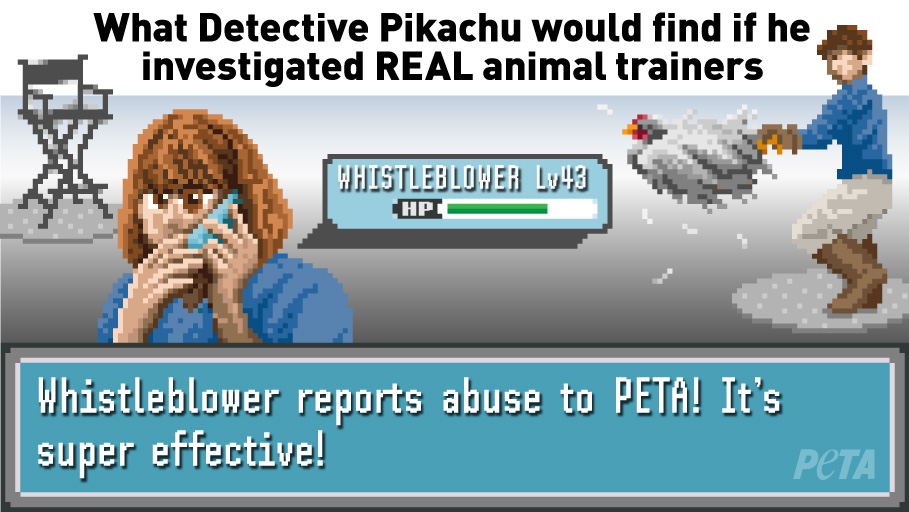What Detective Pikachu Would Find If He Investigated REAL Animal Trainers
There’s a lot to like about Pokémon Detective Pikachu. The film is set in a universe where fantastical creatures and their trainers live in peaceful harmony—one where Pokémon aren’t forced to perform against their will. Sadly, the situation for real animals trained for movies and TV in our world couldn’t be more different.
If Detective Pikachu investigated the cruel and callous Hollywood animal-training industry, he’d uncover violence, neglect, and even death. Check out the Pokémon-inspired images below, depicting actual examples of cruelty to animals that often occur behind the scenes on TV and film sets.
Dogs Are Not Water-Type Pokémon
Dogs are often forced into terrifying situations just so that filmmakers can get the shot they want. On the set of A Dog’s Purpose, shocking footage (which went viral) showed a trainer forcing a dog into rushing water. For the Chinese blockbuster Crazy Alien, a dog was locked in a cage, hoisted into the air by a crane, and spun around before being plunged into a frigid, fast-flowing river. No animal should be put in danger for a movie or TV show.
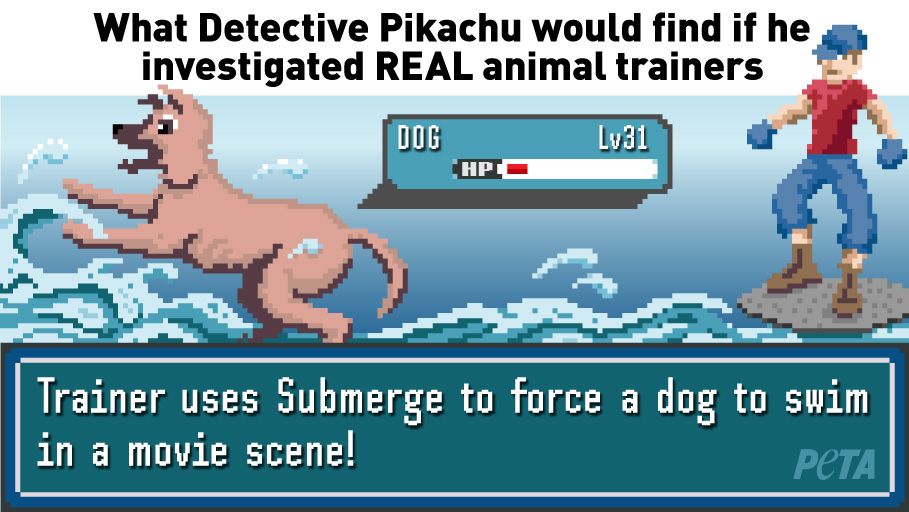
Worse Than Team Rocket
Hollywood trainers have been caught on camera at their private facilities beating wild animals in an attempt to break their spirits and ensure control over them. Fearing more beatings, animals on set—who are keenly aware of the trainer’s subtle, threatening cues—submit and perform in order to avoid more punishment. This technique keeps the trainer from resorting to striking them in front of cast and crew members. One trainer who supplied animals for film and TV productions, including Life of Pi, was caught on camera whipping a tiger approximately 20 times during a training session. He explained that he liked to hit tigers in the face and even boasted about using the whip to “carve [his] initials in their side.’” This is only one example of why big cats and other wild animals should never be used for entertainment.
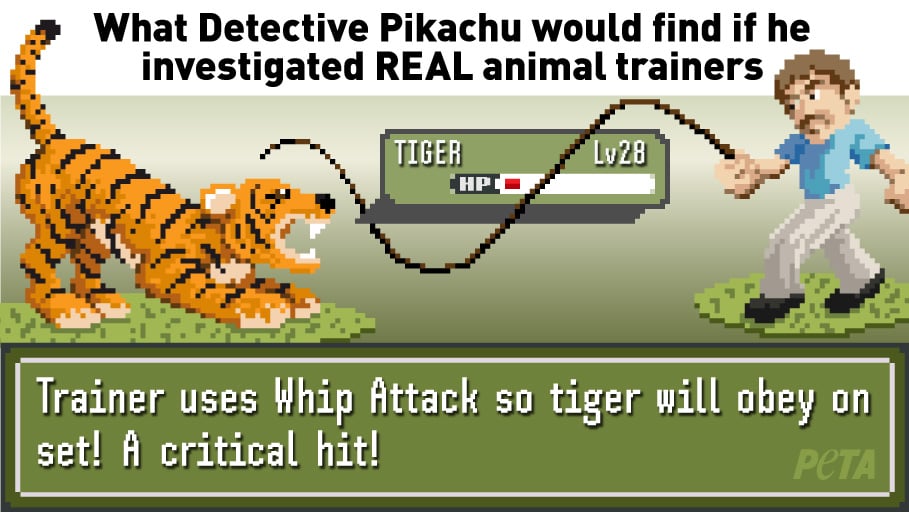
Meowth Can Speak Up—These Cats Can’t
Some trainers resort to food deprivation to meet a director’s requirements or to coerce animals to do tricks for film and TV. Two cats at one of Hollywood’s most prominent suppliers were virtually starved for several days because a trainer said they were “fat.” Moviegoers would be horrified if they knew the suffering that animals endure just so that film execs can line their pockets.
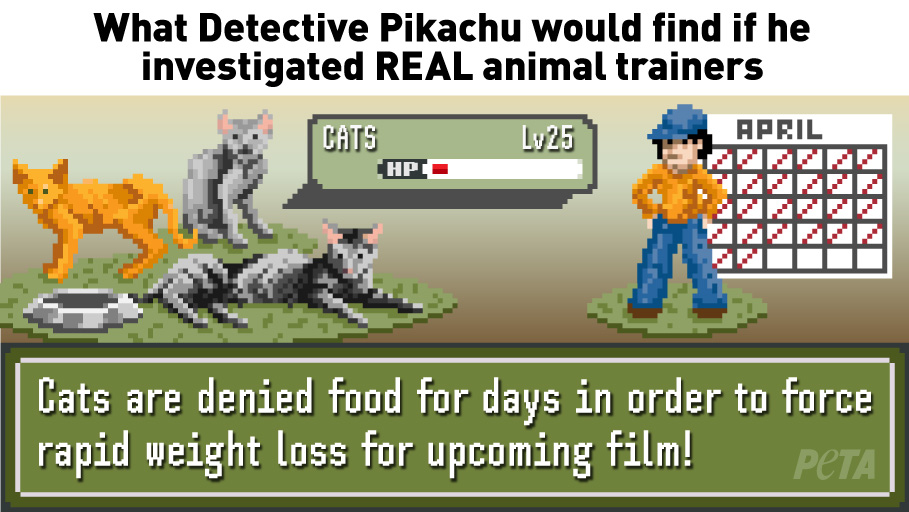
Trainers Are NOT Evolving
Elephants aren’t just abused in circuses. Eyewitness footage shows trainers striking and jabbing an elephant who appeared in HBO’s Westworld with a bullhook—a sharp, metal weapon that resembles a fireplace poker. Meanwhile, compassionate films like The Jungle Book and Dumbo rendered beautiful, lifelike elephants using computer-generated imagery. There’s simply no excuse for hurting an animal—least of all for entertainment. Elephants don’t belong on the big screen.
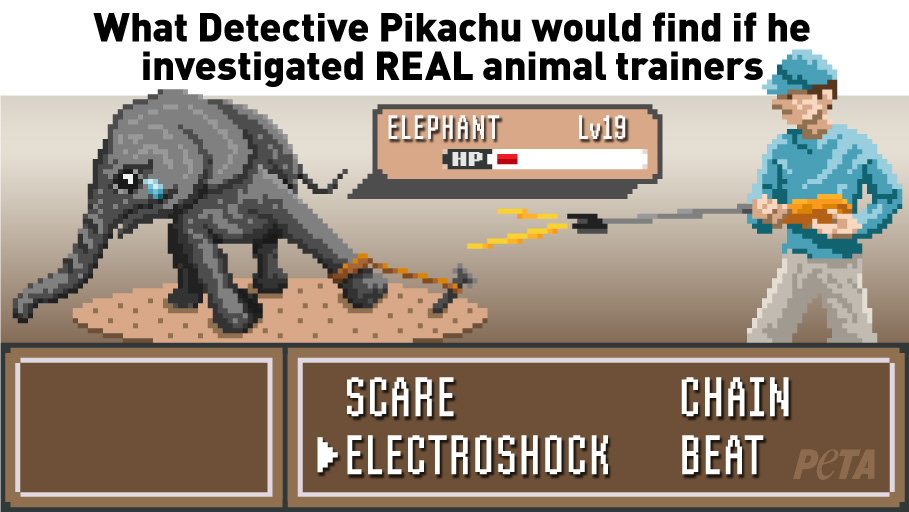
Nurse Joy Would Be Furious
Subjecting sensitive, skittish animals such as horses to the stress of performing for film and television often ends in tragedy. Three horses died in the making of HBO’s Luck, while horses were among the 27 animals who died for Peter Jackson’s The Hobbit. Horses are living, feeling beings—not “losses” for the sake of a movie or TV show.
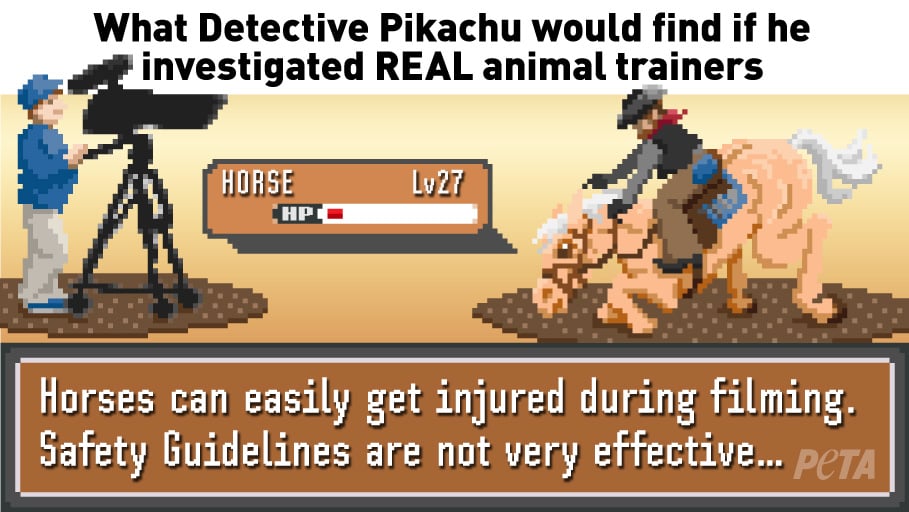
When audiences file out of Pokémon Detective Pikachu this week, PETA urges them to consider the pain and suffering experienced by the animals held captive by real trainers. When the cameras aren’t rolling, animals used in film and TV are typically denied everything that’s natural and important to them, often trapped in barren cages without even the comfort of their own family. The exploitation that they endure on set is only part of the story. Animal abusers have no place in 2019—we gotta catch ’em all!
Be the Very Best, Like No One Ever Was (for Animals)!
PETA’s Animals in Film & Television division works each day to protect animals, but we also rely on members of the public and the entertainment industry to bring any suspected abuse to our attention. Whether you’re a member of the cast or the crew or simply someone walking by a production, if you think an animal is in danger, do your best to document the abuse—and then speak up! Call PETA’s confidential whistleblower hotline at 323-210-2233 or e-mail [email protected] and be a hero to animals!
